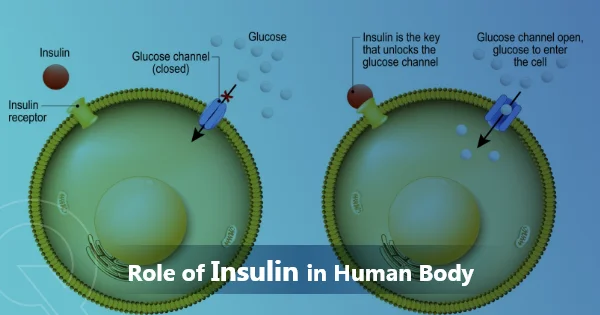Insulin, often described as the “key” to our body’s energy management system, is a hormone produced by the pancreas that plays a crucial role in maintaining our health. Its functions are diverse and profound, impacting our daily lives in ways that are often taken for granted. Without insulin or in cases of dysfunctional insulin regulation, life-threatening conditions can arise. In this blog, we will delve deeper into the intricate and vital role of insulin in the human body.
Contents
What is Insulin?
Insulin, often referred to as the “gatekeeper” of our body’s energy management system, is a hormone produced by the pancreas that plays a fundamental role in regulating our health. This blog will delve deeper into the multifaceted functions of insulin in the human body, exploring how it orchestrates the transfer of glucose from the bloodstream into our cells and ensures that our cells receive the energy they need to function correctly.
1.Blood Sugar Regulation
One of the most pivotal functions of insulin is the regulation of blood sugar levels. This process is akin to a finely tuned orchestra. After we consume food, our digestive system diligently breaks down carbohydrates into glucose, releasing it into the bloodstream. This surge of glucose elevates blood sugar levels, which, if left unchecked, can lead to various health complications. This is where insulin steps in as the conductor, guiding the cells to open their gates and absorb the incoming glucose. It then facilitates the conversion of glucose into energy. This symphony of actions ensures that blood sugar remains within a healthy range.
2.Energy Storage
Insulin’s role extends beyond immediate energy use. It acts as both a storage manager and an energy broker. When there is an excess of glucose in the bloodstream, insulin takes on the role of a financial planner, directing the surplus towards glycogen. Glycogen is stored in the liver and muscles, serving as a reserve source of energy. It’s like a savings account, ready to be tapped into when energy needs increase. Insulin is the messenger that signals the release of stored glucose from glycogen back into the bloodstream when blood sugar levels drop, ensuring a constant and stable energy supply.
3.Inhibition of Gluconeogenesis
In the world of glucose management, insulin is also a regulator of a process known as gluconeogenesis. This complex term describes the liver’s ability to produce glucose. By inhibiting gluconeogenesis, insulin prevents the body from generating excessive amounts of glucose when it is not needed. This precise control mechanism guarantees that blood sugar levels remain stable, preventing unwanted spikes.
4.Protein and Fat Metabolism
Insulin’s involvement in our metabolic orchestra doesn’t stop at glucose management. It plays a significant role in the synthesis of proteins and the metabolism of fats. When insulin arrives on the scene, it promotes the uptake of amino acids by cells, a vital step in protein synthesis. Proteins are the building blocks of our bodies, essential for tissue repair and growth. Additionally, insulin wears the hat of a fat storage manager. It facilitates the storage of excess dietary fats in adipose tissue while inhibiting fat breakdown. This ensures that our bodies maintain a constant source of energy, even between meals.
The Consequences of Insulin Dysfunction
When the body cannot produce enough insulin or becomes resistant to its effects, various health problems can arise. The most common condition associated with insulin dysfunction is diabetes. There are two primary types of diabetes:
1. Type 1 Diabetes: This autoimmune condition occurs when the immune system mistakenly attacks and destroys the insulin-producing beta cells in the pancreas. People with type 1 diabetes require daily insulin injections to regulate their blood sugar.
2. Type 2 Diabetes: This form of diabetes is often linked to lifestyle factors such as poor diet and sedentary behavior. In type 2 diabetes, the body becomes resistant to insulin, leading to elevated blood sugar levels. It can be managed with dietary changes, exercise, and sometimes medication.
Conclusion
Insulin is a fundamental player in the body’s energy management system, regulating blood sugar levels and ensuring that our cells receive the energy they require. Its role in glucose uptake, energy storage, and the inhibition of gluconeogenesis is crucial for overall health. Understanding the importance of insulin can help us make informed choices about our diet and lifestyle to maintain optimal health and reduce the risk of conditions like diabetes.
Frequently asked Questions
Q1:What is the role of insulin in the body and what organ produces it?
A1:Insulin, a vital hormone generated by the pancreas, plays a primary function in regulating glucose levels within our bodies.
Q2:What happens when insulin is high?
A2:Insulin resistance often leads to an increase in insulin production (hyperinsulinemia) to help the body maintain optimal blood sugar levels. However, in cases where an individual has excessive insulin without insulin resistance, it can result in low blood sugar (hypoglycemia).



![Blood Test for Hair Loss [Male/Female] Blood Test for Hair Loss](https://oncquest-blog.s3.ap-south-1.amazonaws.com/blog/wp-content/uploads/2023/12/12044200/Blood-Test-for-Hair-Loss.webp)

